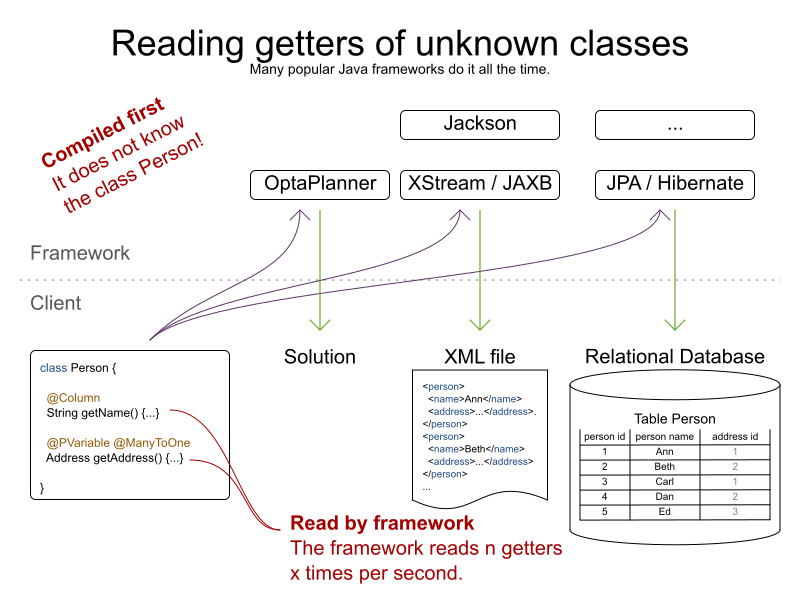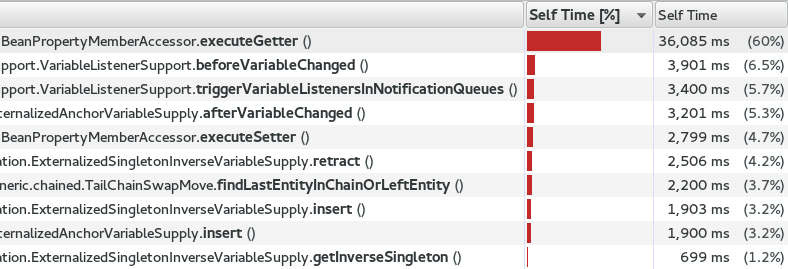Java Reflection, but much faster
What is the fastest way to read a getter from a Java class without knowing the class at compilation time? Java frameworks often do this. A lot. And it can directly influence their performance. So let’s benchmark different approaches, such as reflection, method handles and code generation.
The use case
Presume we have a simple Person class with a name and an address:
public class Person {
...
public String getName() {...}
public Address getAddress() {...}
}and we want to use frameworks such as:
- XStream, JAXB or Jackson to serialize instances to XML or JSON.
- JPA/Hibernate to store persons in a database.
- OptaPlanner to assign addresses (in case they’re tourists or homeless).
None of these frameworks know the Person class. So they can’t simply call person.getName():
// Framework code
public Object executeGetter(Object object) {
// Compilation error: class Person is unknown to the framework
return ((Person) object).getName();
}Instead, the code uses reflection, method handles or code generation.
But such code is called an awful lot:
- If you insert 1000 different persons in a database, JPA/Hibernate probably calls such code 2000 times:
- 1000 calls to
Person.getName() - another 1000 calls to
Person.getAddress()
- 1000 calls to
- Similarly, if you write 1000 different persons to XML or JSON, there are likely 2000 calls by XStream, JAXB or Jackson.
Obviously, when such code is called x times per second, its performance matters.
The benchmarks
Using JMH, I ran a set of micro benchmarks using OpenJDK 1.8.0_111 on Linux on a 64-bit 8-core Intel i7-4790 desktop with 32GB RAM. The JMH benchmark ran with 3 forks, 5 warmup iterations of 1 second and 20 measurement iterations of 1 second.
The source code of that benchmark is in this GitHub repository.
The TL;DR results
- Java Reflection is slow. (*)
- Java MethodHandles are slow too. (*)
- Generated code with
javax.toolsis fast. (*)
(*) On the use cases I benchmarked with the workload I used. Your mileage may vary.
So the devil is in the details. Let’s go through the implementations, to confirm I applied typical magical tricks (such as setAccessible(true)).
Implementations
Direct access (baseline)
I’ve used a normal person.getName() call as the baseline:
public final class MyAccessor {
public Object executeGetter(Object object) {
return ((Person) object).getName();
}
}This takes about 2.7 nanoseconds per operation:
Benchmark Mode Cnt Score Error Units =================================================== DirectAccess avgt 60 2.667 ± 0.028 ns/op
Direct access is naturally the fastest approach at runtime, with no bootstrap cost. But it imports Person at compilation time, so it’s unusable by every framework.
Reflection
The obvious way for a framework read that getter at runtime, without knowing it in advance, is through Java Reflection:
public final class MyAccessor {
private final Method getterMethod;
public MyAccessor() {
getterMethod = Person.class.getMethod("getName");
// Skip Java language access checking during executeGetter()
getterMethod.setAccessible(true);
}
public Object executeGetter(Object bean) {
return getterMethod.invoke(bean);
}
}Adding setAccessible(true) call makes these reflection calls faster, but even then it takes 5.5 nanoseconds per call.
Benchmark Mode Cnt Score Error Units =================================================== DirectAccess avgt 60 2.667 ± 0.028 ns/op Reflection avgt 60 5.511 ± 0.081 ns/op
Reflection is 106% slower than direct access (so about twice as slow). It also takes longer to warm up.
This wasn’t a big surprise to me, because when I profile (using sampling) an artificially simple Traveling Salesman Problem with 980 cities in OptaPlanner, the reflection cost sticks out like a sore thumb:
MethodHandles
MethodHandle was introduced in java 7 to support invokedynamic instructions. According to the javadoc, it’s a typed, directly executable reference to an underlying method. Sounds fast, right?
public final class MyAccessor {
private final MethodHandle getterMethodHandle;
public MyAccessor() {
MethodHandle temp = lookup.findVirtual(Person.class, "getName", MethodType.methodType(String.class));
temp = temp.asType(temp.type().changeParameterType(0 , Object.class));
getterMethodHandle = temp.asType(temp.type().changeReturnType(Object.class));
}
public Object executeGetter(Object bean) {
return getterMethodHandle.invokeExact(bean);
}
}Well unfortunately, MethodHandle is even slower than reflection in OpenJDK 8. It takes 6.1 nanoseconds per operation, so 132% slower than direct access.
Benchmark Mode Cnt Score Error Units =================================================== DirectAccess avgt 60 2.667 ± 0.028 ns/op Reflection avgt 60 5.511 ± 0.081 ns/op MethodHandle avgt 60 6.188 ± 0.059 ns/op StaticMethodHandle avgt 60 5.481 ± 0.069 ns/op
That being said, if the MethodHandle is in a static field, it takes only 5.5 nanoseconds per operation, which is still as slow as reflection. Besides, that’s unusable for most frameworks. For example, a JPA implementation might need to reflect over n classes (Person, Company, Order, …)’s m getters (getName(), getAddress(), getBirthDate(), …), so how can a JPA implementation have n * m static fields without knowing n nor m at compile time?
I do hope that MethodHandle will become as fast as direct access in future Java versions, replacing the need for…
Generated code with javax.tools.JavaCompiler
In Java, it’s possible to compile and run generated Java code at runtime. So with the javax.tools.JavaCompiler API, we can generate the direct access code at runtime:
public abstract class MyAccessor {
public static MyAccessor generate() {
final String String fullClassName = "x.y.generated.MyAccessorPerson$getName";
final String source = "package x.y.generated;\n"
+ "public final class MyAccessorPerson$getName extends MyAccessor {\n"
+ " public Object executeGetter(Object bean) {\n"
+ " return ((Person) object).getName();\n"
+ " }\n"
+ "}";
JavaFileObject fileObject = new ...(fullClassName, source);
JavaCompiler compiler = ToolProvider.getSystemJavaCompiler();
ClassLoader classLoader = ...;
JavaFileManager javaFileManager = new ...(..., classLoader)
CompilationTask task = compiler.getTask(..., javaFileManager, ..., singletonList(fileObject));
boolean success = task.call();
...
Class compiledClass = classLoader.loadClass(fullClassName);
return compiledClass.newInstance();
}
// Implemented by the generated subclass
public abstract Object executeGetter(Object object);
}For more information on how to use javax.tools.JavaCompiler, take a look at page 2 of this article or this article. Besides javax.tools, similar approaches can use ASM or CGLIB, but those infer extra dependencies and might have different performance results.
In any case, the generated code is as fast as direct access:
Benchmark Mode Cnt Score Error Units =================================================== DirectAccess avgt 60 2.667 ± 0.028 ns/op GeneratedCode avgt 60 2.745 ± 0.025 ns/op
So when I ran that exact same Traveling Salesman Problem again in OptaPlanner, this time using code generation to access planning variables, the score calculation speed was 18% faster overall. And the profiling (using sampling) looks much better too:
Note that in normal use cases, that performance gain will hardly be detectable, due to massive CPU needs of a realistically complex score calculation…
The only downside of code generation at runtime is that it infers a noticeable bootstrap cost, especially if the generated code isn’t compiled in bulk. So I am still hoping that some day MethodHandles will get as fast as direct access, just to avoid that bootstrap cost.
Conclusion
In this benchmark, reflection and MethodHandles are twice as slow as direct access in OpenJDK 8, but generated code is as fast as direct access.
Benchmark Mode Cnt Score Error Units =================================================== DirectAccess avgt 60 2.667 ± 0.028 ns/op Reflection avgt 60 5.511 ± 0.081 ns/op MethodHandle avgt 60 6.188 ± 0.059 ns/op StaticMethodHandle avgt 60 5.481 ± 0.069 ns/op GeneratedCode avgt 60 2.745 ± 0.025 ns/op
| Published on Java Code Geeks with permission by Geoffrey De Smet, partner at our JCG program. See the original article here: Java Reflection, but much faster Opinions expressed by Java Code Geeks contributors are their own. |






This might be a useful article if you did not put all the uncompilable crap as code. What are all the … supposed to be? There is no JavaFileObject with two strings as the constructor. This might be a good idea but the article is terrible.
There is a link to the full source in the middle of the article. The generated code approach is very complex and this is just the gist of it.
Should look at the OpenHFT.net compiler package (https://github.com/OpenHFT/Java-Runtime-Compiler).